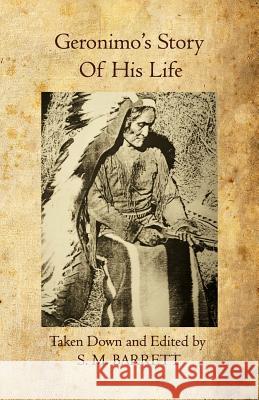Geronimo's Story of His Life » książka
Geronimo's Story of His Life
ISBN-13: 9781456598273 / Angielski / Miękka / 2011 / 150 str.
Geronimo's Story of His Life
ISBN-13: 9781456598273 / Angielski / Miękka / 2011 / 150 str.
(netto: 66,43 VAT: 5%)
Najniższa cena z 30 dni: 68,81
ok. 16-18 dni roboczych.
Darmowa dostawa!
Thank you for checking out this book by Theophania Publishing. We appreciate your business and look forward to serving you soon. We have thousands of titles available, and we invite you to search for us by name, contact us via our website, or download our most recent catalogues. While Geronimo said he was never a chief, he was a military leader. As a Chiricahua Apache, this meant he was one of many people with special spiritual insights and abilities known to Apache people as "Power." Among these were the ability to walk without leaving tracks; the abilities now known as telekinesis and telepathy; and the ability to survive gunshot. Geronimo was wounded numerous times by both bullets and buckshot, but survived. Apache men chose to follow him of their own free will, and offered first-hand eyewitness testimony regarding his many "powers." They declared that this was the main reason why so many chose to follow him: they thought he was favored or protected by "Usen," the Apache high-god. Geronimo's "powers" were considered to be so great that he personally painted the faces of the warriors who followed him to reflect their protective effect. Though outnumbered, Geronimo fought against both Mexican and United States troops and became famous for his daring exploits and numerous escapes from capture up to 1886. At the end of his military career, he led a small band of 36 men, women, and children. They evaded thousands of Mexican and American troops for over a year, making him the most famous Native American of the time and earning him the title of the "worst Indian who ever lived" among white settlers. His band was one of the last major forces of independent Native American warriors who refused to acknowledge the United States occupation of the American West. In February 1909, Geronimo was thrown from his horse while riding home, and had to lie in the cold all night before a friend found him extremely ill. He died of pneumonia on February 17, 1909, as a prisoner of the United States at Fort Sill, Oklahoma. On his deathbed, he confessed to his nephew that he regretted his decision to surrender.
Zawartość książki może nie spełniać oczekiwań – reklamacje nie obejmują treści, która mogła nie być redakcyjnie ani merytorycznie opracowana.











